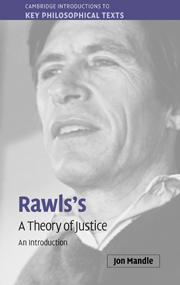3 - Part III of A Theory of Justice – Ends
Published online by Cambridge University Press: 05 June 2012
Summary
TWO THEORIES OF THE GOOD
One of the main goals of part iii of A Theory of Justice is to develop an account of the stability of a well-ordered society. We have already seen that the stability of a society depends on the sense of justice of its citizens. We must now consider how people in a well-ordered society would come to acquire a sense of justice and the attitude that they would have toward that sense of justice once it is acquired. Their reflective attitude will largely be a matter of how well their sense of justice fits with their other values and goals. When they fit together well and support one another, they are said to be “congruent.” To see whether and the extent to which a sense of justice fits with other elements of a person's values, we must clarify the idea of the good. Justice as fairness, in fact, relies on two theories of the good:
The reason for doing this is that in justice as fairness the concept of right is prior to that of the good. In contrast with teleological theories, something is good only if it fits into ways of life consistent with the principles of right already on hand. But to establish these principles it is necessary to rely on some notion of goodness, for we need assumptions about the parties' motives in the original position. Since these assumptions must not jeopardize the prior place of the concept of right, the theory of the good used in arguing for the principles of justice is restricted to the bare essentials.
(TJ, 396/347—8)- Type
- Chapter
- Information
- Rawls's 'A Theory of Justice'An Introduction, pp. 109 - 141Publisher: Cambridge University PressPrint publication year: 2009

